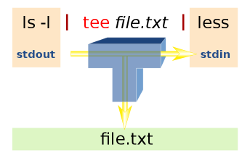The command “tee” it’s one of the basic commands that you should find in any system, yet it’s not so popular or use, this command reads standard input and writes it to both standard output and one or more files, effectively duplicating its input. It is primarily used in conjunction with pipes and filters. The command is named after the T-splitter used in plumbing.
In short if you want to redirect the STDOUT of any command as well as printing it to the screen, tee is the right tool to use, let’s see some practical use of this command.
Continue reading »


